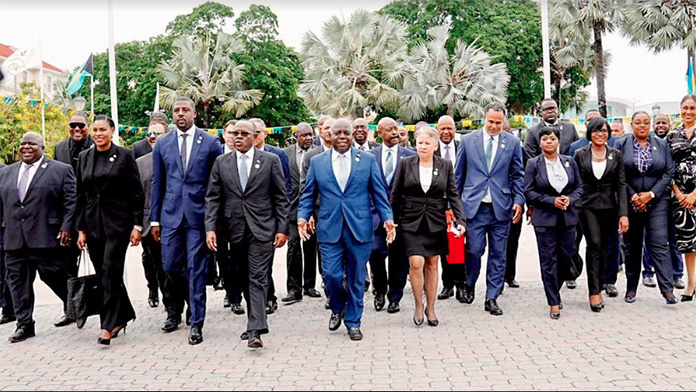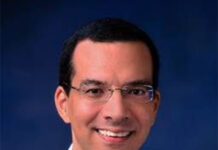NO NEW TAXES!!!

NASSAU, The Bahamas – As he gave a review of fiscal performance during the first three quarters of the 2022/23 fiscal year (July 2022 – March 2023), Prime Minister and Minister of Finance the Hon. Philip Davis noted, on May 31, 2023, that total revenue amounted to $2.1 billion for the first nine months of the fiscal year 2022/23.
“This represents an increase of $267.2 million, or 14.5 percent, when compared to the previous year,” Prime Minister Davis said, during his Communication on Budget 2023, in the House of Assembly.
“To date, total revenue stands at 73.9 percent of the budget forecast.”
Prime Minister Davis pointed out that, to more properly assess the magnitude of that improvement, it can be compared to the performance in Fiscal Year 2018/19, the last normal year before the pandemic. In that earlier period, he added, total revenue collected during the first nine months of the fiscal year accounted for 63.7 percent of the budget forecast.
“Improved performance in respect of total revenue was supported by a period-over-period increase of $291.3 million in tax revenue, which totalled $1.8 billion during the period,” he said.
“To date, tax revenue accounts for 72.9 percent of the budget forecast.”
“Again, for the sake of comparison, tax revenue collected during the first three quarters of Fiscal Year 2018/19 represented only 62.6 percent of the budget then forecasted,” he added.
Prime Minister Davis noted that the following key points concerning the revenue were noteworthy.
He said: “Taxes collected on property grew by $24.3 million and totalled $130.7 million, which represents 77.1 percent of the budget target. This is in line with collection trends, as majority of property taxes are paid in the second half of the fiscal year.”
“VAT receipts improved by $112.4 million and amounted to $947.5 million, representing 67.1 percent of the budget target,” Prime Minister Davis added. “This enhanced collection of Value Added Tax is due to a better economic climate when compared to the previous year, as well as the efforts of the reconstituted Revenue Enhancement Unit.”
Prime Minister Davis stated that Stamp Taxes on financial transactions and VAT on real estate transactions grew by $28.8 million and totalled $80.5 million, which had surpassed the budget forecast by 16.3 percent or $11.3 million.
Gaming Taxes, he added, also grew by $11.8 million to a level of $49.2 million and represented 93.4 percent of the budget forecast at the nine-month mark.
“Licenses to conduct special business activity, which comprise specific business licenses and communication levies, increased by $8.1 million and totalled $89.1 million,” Prime Minister Davis said. “To date, this represents 68.2 percent of the budget forecast.”
He that taxes on international trade and transactions increased by $151.4 million and totalled $498.0 million.
Prime Minister Davis said: “This category’s strong performance, which represents 80.8 percent of the budget forecast, can be primarily attributed to the following factors:
Departure tax collections increased by $80.0 million and totalled $128.6 million, which has surpassed the budget forecast by 32.6 percent or $31.6 million.
Excise duties firmed by $63.5 million and totalled $180.1 million, reflecting 66.8 percent of the budget forecast.
Customs and other import duties improved by $7.8 million and totalled $188.8 million, for 75.6 percent of the budget.”
He also reiterated his thanks to the public and the business community for their cooperation in acknowledging their responsibility; and the revenue agencies for their efforts.
Turning his review to Expenditure, Prime Minister Davis stated that total expenditure increased by $145.3 million to a total of $2.3 billion during the first nine months of the fiscal year. That, he said, accounted for 67.8 percent of the budget target.
“In the recurrent expenditure component, spending increased by $111.6 million to total $2.1 billion, which accounts for 69.4 percent of the budget forecast,” he added. “Spending on compensation of employees increased by $55.7 million to total $594.0 million, representing 71.7 percent of the budget target.”
Prime Minister stated that, in that regard, it was important to note the recent developments in labour policies that had brought about positive changes for public sector workers in The Bahamas.
“These include an increase in the public sector minimum wage rate from $210.00 to $260.00 per week, as well as industrial agreements that have been signed with various unions,” he said.
“For instance, the Ministry of Education and Technical & Vocational Training, in collaboration with the three unions, has implemented a retention bonus scheme, and awarded salary increases and increments for teachers and administrators,” he added. “Similarly, the Bahamas Nurses Union has successfully negotiated with the government to secure a retention bonus and other benefits for nurses.”
In addition, Prime Minister Davis pointed out, public officers such as police officers, Defence Force Officers, and other orderly officers received a salary adjustment in December 2022, retroactive to July 1, 2022.
“These developments signify a significant step towards offering equitable compensation for those who serve the public in The Bahamas,” he said.
Looking now to other categories of spending, Prime Minister Davis noted that public debt interest payments increased by $58.0 million to total $391.8 million, and amounted to 70.0 percent of the budget forecast.
“Payments on foreign currency obligations totalled $197.2 million or 50.3 percent, while payments on our domestic debt obligations totalled $194.6 million or 49.7 percent of targeted numbers,” he said.
As a result of the tightening in global monetary policy, the average cost of borrowing in foreign currency had risen over the past nine months, Prime Minister Davis pointed out. Spending on the use of goods and services increased by $29.0 million to total $432.0 million, he added. To date, that accounted for 64.1 percent of the budget forecast, he shared.
“Current transfers not elsewhere classified increased by $33.1 million and totalled $163.3 million, or 63.9 percent of the budget forecast,” Prime Minister Davis said.
He added that, beyond those increases in expenditure, a few categories of spending experienced reductions.
“Government subsidies narrowed by $20.9 million and totalled $330.4 million,” Prime Minister Davis said. “This equals 76.4 percent of the budget forecast.”
“Government’s COVID-19 recurrent expenditure measures over the nine-months of this fiscal year totalled $6.2 million,” he added. “This represents a 94.4 percent decrease compared to the $96.6 million distributed at the end of June 2022.”
In respect of capital expenditure, Prime Minister Davis said that, during the first three quarters spending increased by $33.7 million, totalling $193.9 million, which accounted for 54.0 percent of the budget forecast. Expenditure on the acquisition of non-financial assets increased by $42.4 million and totalled $167.4 million, which represented 63.4 percent of the budget forecast, he added.
Prime Minister Davis said: “This increase was the result of the following items of expenditure:
Investments in buildings other than dwellings increased by $31.2 million and totalled $83.4 million, which accounts for 68.1 percent of budget forecast. This mainly reflected higher expenditure on upgrades and maintenance of Government buildings, construction and repair of schools, and upkeep of the community.”
“Expenditure on transport equipment increased by $3.4 million and totalled 5.7 million, which represents 49.3 percent of budget forecast,” he continued. “This was primarily owing to higher outlays for military vessel maintenance and motor vehicles.”
Outlays for other structures increased by $7.3 million and totalled $53.0 million, which represented 59.2 percent of budget forecast, Prime Minister Davis said. During the period, further investments were made towards New Providence roadwork, he added.
“Land improvement expenditures increased by $1.2 million to total $4.9 million, which accounts for 81.4 percent of budget,” he noted. “This was mainly attributed to parks and ground improvements.”
“Capital transfers declined by $8.5 million and totalled $26.6 million, representing 28.0 percent of the budget forecast,” he added. “The decrease in transfers can be attributed to the gradual decrease in COVID-19 and Hurricane Dorian support provisions.”
Prime Minister Davis pointed out that Central Government’s fiscal performance for the first nine months of the fiscal year show a deficit of $216.2 million, which accounted for 1.6 percent of nominal GDP. That deficit equated to 37.6 percent of the budget target, he said.
“Compared to the previous year, the deficit to date represents a decrease of $120.1 million from the deficit of $336.3 million in the same period of the prior year,” he added. “The deficit in the previous year accounted for 2.7 percent of nominal GDP.”
Prime Minister Davis stated that, at the end of March 2023, the primary balance reflected a surplus equating to $175.6 million, a striking improvement from the primary deficit of $2.4 million in the previous year. The primary surplus experienced in the first nine months of Fiscal Year 2022/23 “greatly exceeded” the targeted $25.0 million set in the Draft Estimates of Revenue and Expenditure, as well as the $4 million deficit projected in the 2022 Fiscal Strategy Report, he added.
“The sizeable surplus signifies that primary government spending, that is public spending excluding interest payments, is less than revenue collection,” Prime Minister Davis stressed.
“A continued primary surplus is essential to the target of achieving a balanced budget by Fiscal Year 2024/25, and reducing the burden of central debt over the medium term.”
Prime Minister Davis noted that, as a result of net borrowing activities, central Government net debt increased over the nine months by $290.8 million to a total $11.1 billion.
“At the end of March 2023, domestic currency debt accounted for $5.9 billion or 53.4 percent of total central Government debt,” he said. “Foreign currency debt accounted for $5.2 billion or 46.6 percent of total central Government debt.”
“As I mentioned earlier, over the period, the debt-to-GDP ratio has been trending downwards.”
Prime Minister Davis pointed out that, at end of June 2022, the end of the previous fiscal year, the debt stock was equal to 87.3 percent of GDP.
“However, at end of March 2023, the end of the third quarter of the current fiscal year, the debt stock equalled 83.5 percent of GDP, which represents a 4.4 percent decline from end of June 2022,” he said. (BIS Photo/Ulric Woodside)







